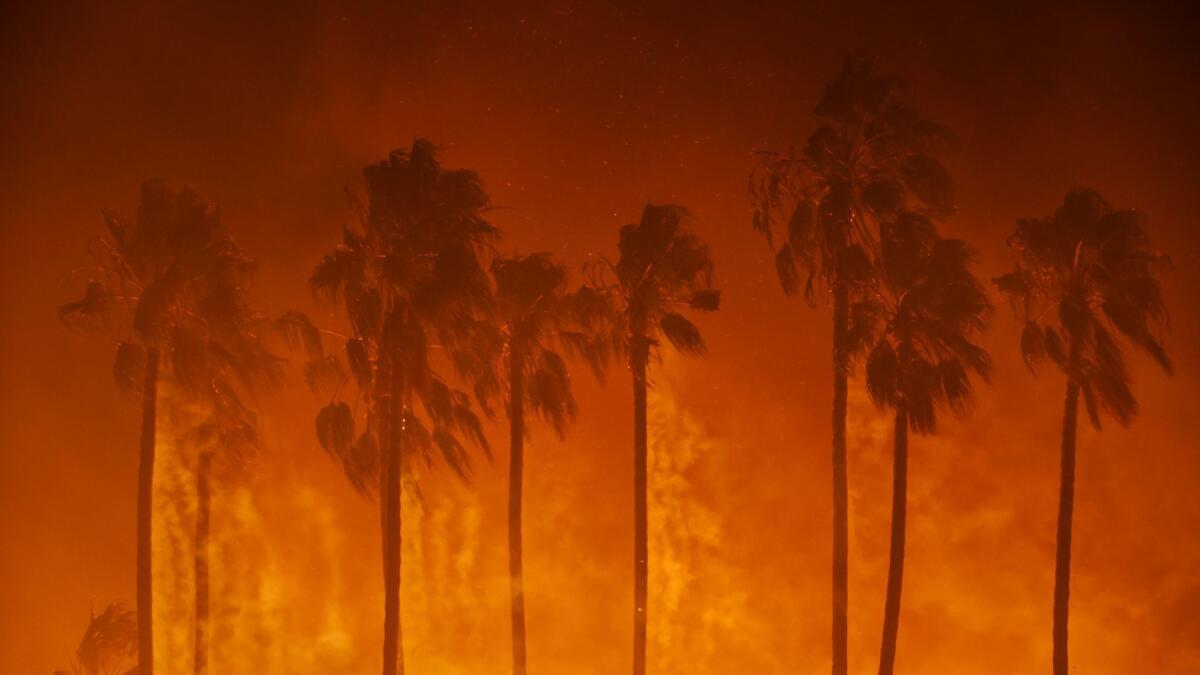Climate change should tamp down California’s wildfire-fanning Santa Ana winds, study finds

- Share via
Scientists have warned that California should brace for more wildfire as global warming drives longer bouts of hot and dry weather.
Now researchers at UC San Diego’s Scripps Institution of Oceanography have found a positive trend when it comes to Southern California’s battle against destructive blazes.
Santa Ana winds — which routinely whip up walls of flame through brush-covered hillsides — are likely to be tempered in coming decades as a result of climate change, according to a paper published Wednesday in the journal Geophysical Research Letters.
According to the study summarized by the paper, Santa Ana winds will become about 18% less frequent toward the end of the century if climate change continues unabated.
“For fire, at least this element that determines risk carries some good news,” said Sasha Gershunov, a research meteorologist at Scripps and co-author of the report.
The study predicts that the rate of such strong wind events will decrease specifically in the fall and spring.
The number of Santa Ana wind events, for example, could be nearly cut in half in September and October by midcentury, according to the study. And in April and May, that reduction could be about 40%.
“In order to understand changes in future wildfire risk you have to take all of the ingredients,” he said. “It’s not clear which way the risk is changing, but the thing that seems clear is that we’re looking at a later wildfire season.”
The authors said it’s important for researchers to include the effects of climate change on the Santa Anas when modeling long-term trends in wildfire.
“These changes in Santa Ana winds add important detail to the expectation of drier and warmer conditions in the future, which is crucial to have a better understanding of changes in our regional climate,” Janin Guzman-Morales, the lead author of the study and a postdoctoral student at Scripps, said in a statement.
Santa Ana winds in the middle of winter, at their peak, are not expected to be as significantly disrupted, according to the study.
Noah Diffenbaugh, an earth science professor at Stanford, said the findings were an important contribution to understanding wildfire risk in California.
However, he said the result didn’t assuage his concerns about climate change’s potential to drive dangerous conflagrations.
“I don’t see a sufficient reduction of winds to override the wildfire risks from warming,” he said. “It’s clear that the warming itself has already substantially increased wildfire risk.”
Santa Ana winds start when cold air collects in the Great Basin of Nevada and Utah. If a high-pressure system blows that cool air west, the colder and thus heavier air rushes down the mountains to the warmer Pacific Coast at considerable speed.
Climate change will make those cold-air conditions less frequent, while also disrupting easterly winds, according to the study.
The dry gusts are a reversal of the more common winds that blow east, carrying moisture, and they bring warmer weather and clear skies in winter months.
They can also knock down trees and kick up particulate matter that triggers allergies.
According to records kept by the California Department of Forestry and Fire Protection, the state’s most devastating and deadly conflagrations have overwhelmingly resulted from wind-driven blazes fanning flames through grassland and chaparral systems.
For example, the largest fire in Southern California history, the Thomas fire, occurred in December 2017 when back-to-back Santa Ana wind events blew flames through Santa Barbara and Ventura counties, destroying more than a thousand structures.
The Scripps study found that while such consecutive wildfire events will be somewhat less likely in the future, the risk will continue, especially in December.
Smith writes for the San Diego Union-Tribune.






